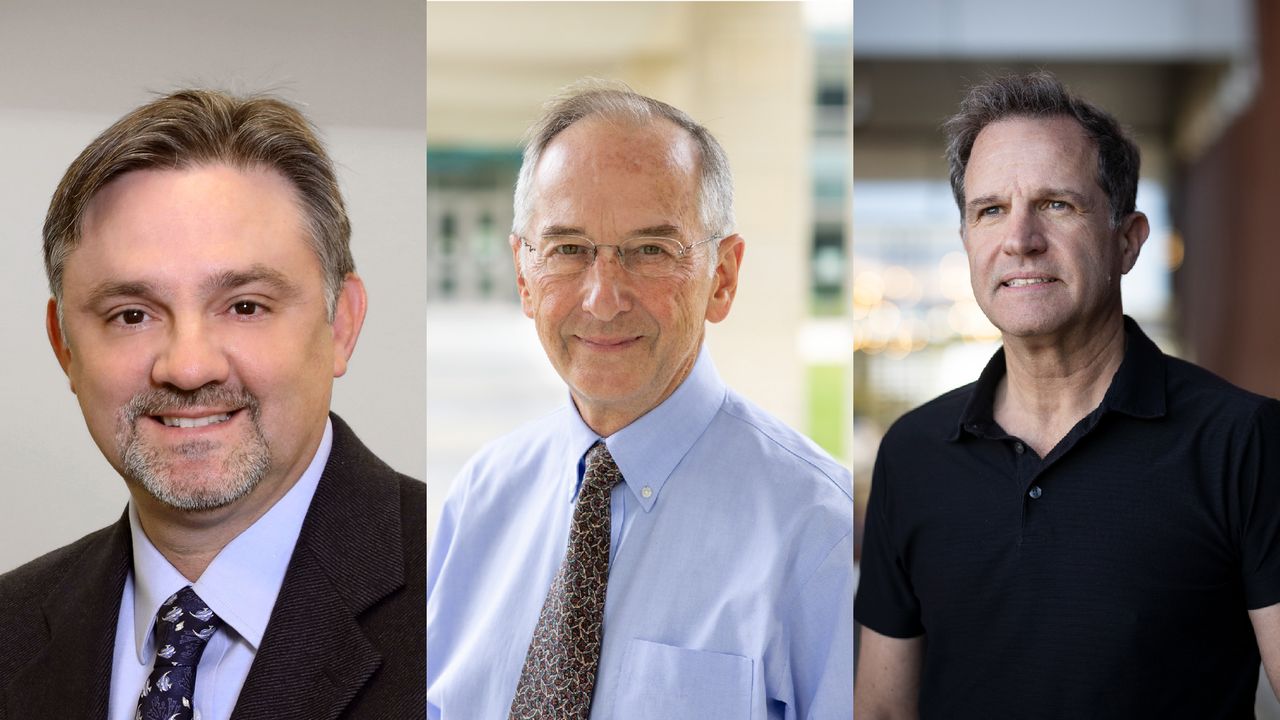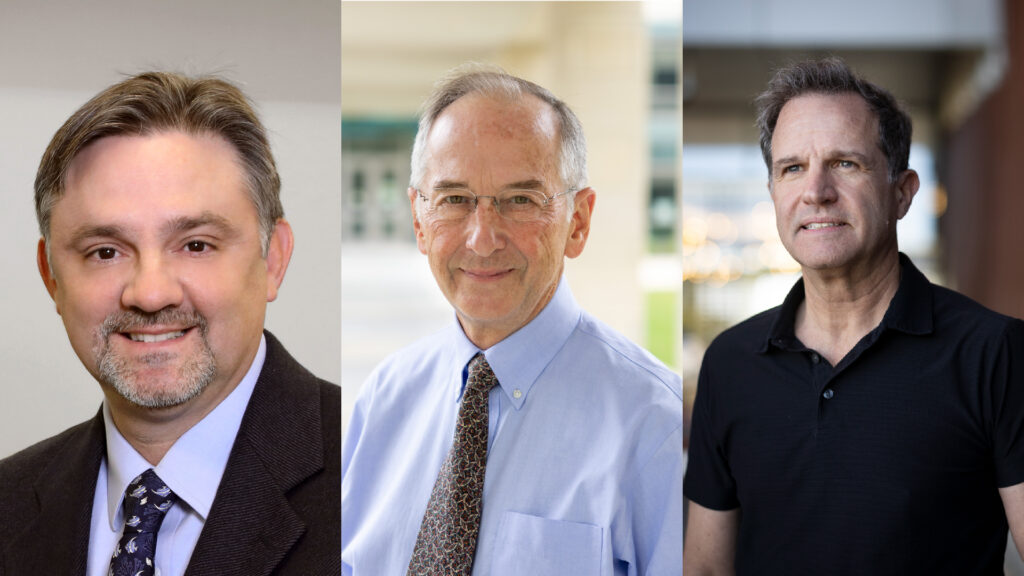
Three scientists have won a $250,000 award for their contributions to developing a life-saving therapy for the genetic disease cystic fibrosis (CF).
The prize, called the Lasker-DeBakey Clinical Medical Research Award, went to Dr. Michael Welsh of the University of Iowa, Paul Negulescu of Vertex Therapeutics and Jesús (Tito) González of Integro Theranostics. It’s one of this year’s Lasker Awards — biomedical-research prizes established in 1945 that are often called the “American Nobels.”
“It’s super gratifying,” said González, who was formerly the senior director of biology at Vertex Therapeutics. “It’s very rare to actually have something [in medical research] that goes all the way to patients and is made widely available, and to have such a dramatic effect,” he told Live Science.
The treatment, called Trikafta, extends the lifespans of people with CF by decades — and patients who start treatment in childhood or adolescence are expected to live near-average lifespans. By comparison, when the disease was first discovered in the 1930s, most patients died in early childhood. And even in the 2010s, before Trikafta’s approval in 2019, about half of CF patients died before age 40.
“Today, the estimated median age of survival for persons with cystic fibrosis who were born between 2020 and 2024 and have access to treatment is 65 years,” Dr. Eric Sorscher of Emory University wrote in an essay about the award, published in The New England Journal of Medicine. “Available projections suggest that health and longevity may increase further as modulators begin to be administered at younger ages.”
The Lasker Award “also brings back a lot of great memories and it really warms your heart when you think of all the people you’ve worked with, and all the time and effort,” González added. “I just hope people understand how difficult it is to go this far.”
Related: Scientist who discovered body’s ‘fire alarm’ against invading bacteria wins $250,000 Lasker prize
CF is an inherited disorder caused by mutations in a gene called CFTR. When functional, the gene enables cells to make tubes inside their membranes that charged particles called ions can flow through. That, in turn, lets water flow as it should through tissues and helps organs, like the lungs, intestines and pancreas, do their jobs properly.
But in CF, the CFTR gene malfunctions, causing thick, sticky mucus to clog the linings of these organs. The mucus gums up airways, raising the risk of dangerous infections and scarring in the lungs, and it can cause issues with digestion, the absorption of nutrients and insulin signaling.
Lab research conducted by Welsh in the 1980s and 1990s helped lay the groundwork for Trikafta, a drug that addresses the molecular cause of most types of CF. Working with cells from the airways of people with the disease, Welsh and colleagues unraveled the “physiological consequences” of the most common genetic error seen in people with CF, González explained.
Their work demonstrated that this defect in the CFTR gene — known as delta-f508 — makes it so that charged particles can’t pass through the tubes in the cell membrane as easily. The mutation means that the tubes never actually reach the surface of the cell, so the ions get stuck. In various experiments that involved cooling down the cells as they grew in lab dishes, Welsh showed that the tube could be made to reach the cell surface and thus better transport ions.
Meanwhile, as a postdoctoral scholar in the lab of Nobel-winner Roger Tsien, González co-invented a system that could accurately track the flow of ions across cell membranes in real time. The initial inspiration behind the system was to study how the brain worked, as ions moving across membranes enable brain cells to fire, he said. But the system was also perfect for testing potential new CF drugs designed to fix the ion-transport issues.
“This allowed us to screen tens of thousands of compounds a day,” González said. “While electrophysiology, the standard method at the time for studying ion channels in depth, was very slow, just a handful a day.”
The researchers refined the process to hunt for CF drugs at biotech company Aurora Biosciences, which was later acquired by Vertex Pharmaceuticals.
Negulescu, also at Aurora and later Vertex, led the project of screening molecules to see how they affected ion transport. His team looked for “potentiators,” which boost the flow of ions, and “correctors,” which help move the tubes into the right position in the cell membrane. This effort led to the approval of several iterations of CF drugs — in 2012, 2015 and 2018 — before finally leading to Trikafta’s approval in 2019.
When they started getting data back from the earliest human trials of their first-generation drug, González recalled “that was super exciting because that it became very real. It’s like, ‘Oh wow, this is not just theory; this is actually working in patients.'”
Trikafta combines three drugs to effectively treat most people with CF. Its use has reduced the number of lung transplants and hospitalizations for infection among people with the disease, and improved patients’ quality of life, according to a statement from the Lasker Awards.
“Welsh, González, and Negulescu’s achievements are affording people with CF the chance to thrive now and to plan vibrant futures,” the statement says.
Two additional Lasker Awards were awarded this year, including one for basic research and another for special achievements in medical science.
The former prize went to Dirk Görlich of the Max Planck Institute for Multidisciplinary Sciences in Germany and Steven McKnight of the University of Texas Southwestern Medical Center. These two researchers uncovered unsung roles for low-complexity domains — complex regions of protein sequences — which are key to how cells organize their innards, and also explored how that organization goes awry in disease.
The latter prize went to Lucy Shapiro of Stanford University to recognize her 55-year career in biomedical sciences, during which she has reshaped biologists’ understanding of how bacterial cells divide and develop. In particular, her work highlighted the importance of spatial organization within bacterial cells, and how this relates to the way they work internally. She’s also being recognized as the founding director of Stanford’s Department of Developmental Biology, which was established in 1989, as well as a key consultant to global leaders on issues such as antibiotic resistance, emerging infectious diseases and biological warfare.
This article is for informational purposes only and is not meant to offer medical advice.
